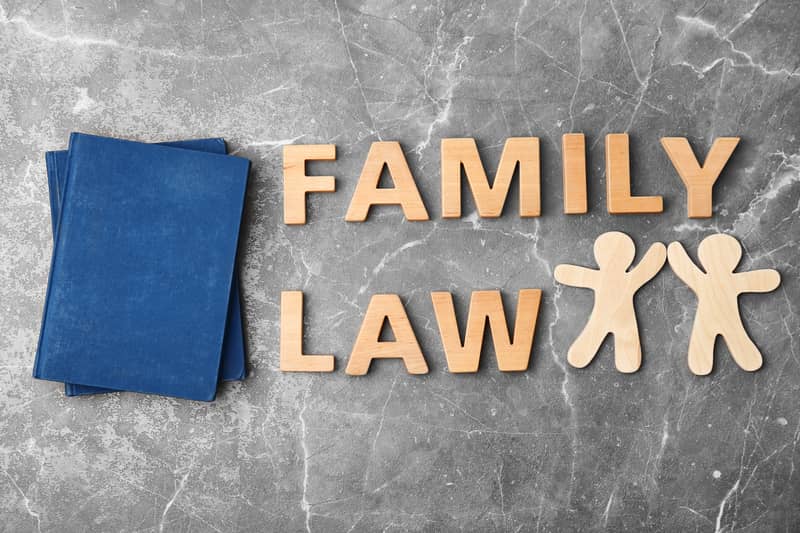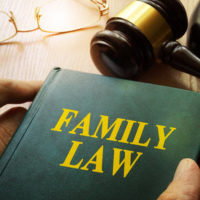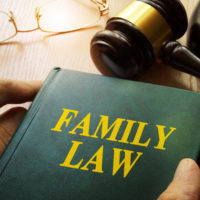
A Review of the Child Custody Determination Process
 The Uniform Child Custody Jurisdiction and Enforcement Act (UCCJEA) is a uniform law drafted by the Uniform Law Commission in 1997. The UCCJEA encompasses a set of guidelines for courts to follow in their determination of child custody. To date, the law has been adopted by 49 states and Washington, DC. The UCCJEA breaks down legal and physical custody, sole and joint custody, grandparent visitation rights as well as factors to assess custodial rights.
The Uniform Child Custody Jurisdiction and Enforcement Act (UCCJEA) is a uniform law drafted by the Uniform Law Commission in 1997. The UCCJEA encompasses a set of guidelines for courts to follow in their determination of child custody. To date, the law has been adopted by 49 states and Washington, DC. The UCCJEA breaks down legal and physical custody, sole and joint custody, grandparent visitation rights as well as factors to assess custodial rights.
Legal and Physical Custody
The law has divided custodial rights into two categories (legal and physical custody). Legal custody is the right and obligation to make decisions about the child’s well-being and upbringing. These include decisions regarding the child’s schooling, medical care and religious activities. Many states normally permit both parents to share legal custody of the child depending on the circumstances of the custody case. Physical custody is the right of a parent to have a child reside with him or her. There are two forms of physical and legal custody: sole or joint custody.
Joint or Sole Custody
There is a common misconception in child custody proceedings surrounding the definition of joint and sole custody. Many misconstrue these terms as a reference to physical custody alone. However, when a parent shares a form of custody, they are deemed to have joint custody for that specific form of custody. When one parent has a form of custody, they have sole custody for that form of custody. It is common for both parents to have joint legal custody while one parent has sole physical custody with visitation rights. Another arrangement permits one parent to have custody over the child during the school year while the other parent has custody over summer and spring breaks as well as certain weekends. This is another form of joint physical custody.
“Best Interests” Factors
With North Carolina’s adoption of the UCCJEA, the state is mandated to adhere to certain standards when determining child custody. A court determining child custody in North Carolina must consider a litany of circumstances surround the child and the many dynamics involved in the family’s life. Here are few of the factors a court will take into consideration:
- each parent’s wishes regarding custody
- the child’s age, sex, physical and mental health
- the child’s adjustment to home, school and community
- the child’s involvement in a religious faith
- each parent’s history of domestic violence (if any)
- each parent’s work schedule and child-care arrangements, and
- the child’s preference, if the child has reached age of discretion.
The overarching theme when determining custody is the “best interests” of the child. This best interests concept seeks to ensure and maintain the overall well-being of the child to foster their growth and development.
Charlotte Child Custody Attorneys
It is imperative that you hire an experienced family law attorney if you seek to fight for the custody of your child. The importance of this endeavor is too high to not involve a knowledgeable attorney. The experienced lawyers at Powers Landreth PLLC will advise and provide you with aggressive representation on all your child custody matters. Contact us now for a consultation.
Resources:
law.cornell.edu/wex/legal_custody
uniformlaws.org/shared/docs/child_custody_jurisdiction/uccjea_final_97.pdf
ncga.state.nc.us/gascripts/statutes/statutelookup.pl?statute=50-13.2
Learn More
Spousal Privilege: When Marriage Protects
 Spousal privilege is the legal and policy doctrine that accords confidentiality between spouses with an aim to encourage martial harmony and to protect families. There are two types of spousal privilege: (1) testimonial privilege and (2) communications privilege. Each privilege applies in finite circumstances and requires an inquiry into the status of the marriage.
Spousal privilege is the legal and policy doctrine that accords confidentiality between spouses with an aim to encourage martial harmony and to protect families. There are two types of spousal privilege: (1) testimonial privilege and (2) communications privilege. Each privilege applies in finite circumstances and requires an inquiry into the status of the marriage.
Testimonial Privilege
Testimonial privilege is asserted in criminal cases. In this scenario, one spouse is called to testify against another spouse in a criminal proceeding. The spouse who is being called to the stand can assert testimonial privilege and refuse to testify against the defendant spouse. At the same time, this privilege is not absolute. The witness spouse may choose to waive his or her privilege and testify anyway. This can occur even under the objection of the defendant spouse. In different jurisdictions, there are exceptions to testimonial privilege including in the case of marital rape. For the testimonial privilege to apply, the defendant spouse and the witness spouse must be married at the time the privilege is asserted.
Communications Privilege
Spousal communication privilege is asserted in both criminal and civil cases. This privilege covers words uttered and actions taken during the marriage. The totality of the circumstances must convey that the communication was intended as private. Therefore, one spouse can assert the communications privilege when asked to testify to private, confidential communications occurring during the marriage. Unlike testimonial privilege, communications privilege survives the end of the marriage. As such, a spouse can assert the communications privilege as long as the communication occurred during marriage even though the marriage has now ended in divorce or death. In the case of spousal communications, both spouses are permitted to refuse to make a disclosure. The burden is on the opposing party to prove that the words or acts were not intended as private.
Spousal Privilege in North Carolina
The spousal testimonial and communications privileges are known as common law constructions. In North Carolina, these privileges are statutory. The statutory formation may include multiple exceptions to the rules conveying that the state is more interested in other matters that may trump keeping harmony in the marital relationship. Spousal communication privilege in North Carolina is quite similar to the common law construction:
No husband or wife shall be compellable to disclose any confidential communication made by one to the other during their marriage.
However, North Carolina provides the following exception in its version of testimonial privilege:
- Criminal cohabitation or bigamy
- Assault or threats
- Trespass upon the residence of other spouse when living separately
- Abandonment or failure to provide support
- In the prosecution of one spouse for any criminal offense against the minor child of the couple or one spouse
Charlotte Divorce Attorneys
The spousal testimonial and communications privileges can appear as obscure evidentiary rules. However, in practice the assertion or lack thereof can have severe repercussions in divorce proceedings and related criminal mattress. The lawyers at Powers Landreth PLLC can advise you on spousal privilege matters and prepare you accordingly. Contact us now for a consultation.
Resources:
law.cornell.edu/wex/marital_privilege
ncga.state.nc.us/enactedlegislation/statutes/html/bysection/chapter_8/gs_8-57.html
law.cornell.edu/wex/marital_privilege
Learn More
Candlelight Vigil for North Carolina’s Domestic Violence Victims
 A crowd gathered in Graham, North Carolina, on to remember 77 victims who died as a result of domestic violence in the state in the past year, according to an article by The Times-News.
A crowd gathered in Graham, North Carolina, on to remember 77 victims who died as a result of domestic violence in the state in the past year, according to an article by The Times-News.
A joint effort organized by the Family Justice Center and Family Abuse Services, attendees assembled in front of the Alamance County War Memorial. With a crowd bearing candles to the light the night, the name of every one of the 77 domestic violence victims rang out into the darkness.
Part of the motivation for organizing this event centers on raising awareness of the growing domestic violence epidemic across Alamance County.
What is the Definition of Domestic Violence in North Carolina?
The legislature outlined the state-specific approach to domestic violence in Section 50B-1 of the North Carolina General Statutes. There are two major elements to the crime of domestic violence – personal relationships and types of conduct.
What is the Definition of Personal Relationship in North Carolina?
One element of the North Carolina definition of domestic violence concerns personal relationships. There are six different types of personal relationships outlined under Section 50B-1.
In order to qualify as a personal relationship, the people must be:
- Married or previously married;
- A male and female who currently live or previously lived together;
- In a parent-child or grandparent-grandchild relationship;
- Parents to the same child;
- Current or previous household members; or
- A male and female who are currently or were previously in a dating relationship.
What Conduct Qualifies as Domestic Violence in North Carolina?
The other element of the North Carolina definition of domestic violence concerns certain conduct. In cases where the perpetrator and victim have a personal relationship, it is domestic violence if the perpetrator:
- Inflicts harm or injury or attempts to inflict harm or injury;
- Threatens or harasses to the point of severe emotional distress; or
- Commits a sex crime, including rape.
Section 50B-1 does offer a specific exception concerning self-defense. If a person is in reasonable danger of injury or death, then they are allowed to defend themselves. In such circumstances of reasonable self-defense, it is not considered domestic violence.
Let Us Help You with Your Case
Whether you are facing domestic violence, divorce or other aspects of family law, it is important to have professional help. Don’t hesitate to reach out to Powers Landreth PLLC in Charlotte, North Carolina for assistance with your case.
Learn More
Can North Carolina Magistrates Refuse to Perform Same Sex Marriage?
 After a federal appeals court ruling, a North Carolina law that enables magistrates to refrain from performing same sex marriages will continue in full force, according to an article by The Charlotte Observer.
After a federal appeals court ruling, a North Carolina law that enables magistrates to refrain from performing same sex marriages will continue in full force, according to an article by The Charlotte Observer.
Introduced as Senate Bill 2 by State Senator Phil Berger, the law in question allows magistrates and other officials to decline to perform a lawful marriage based on religious objections. Senate Bill 2 arrived in the North Carolina legislature in 2015, in response to a 2014 federal court decision.
That 2014 decision essentially legalized same sex marriage legal in North Carolina. Moreover, any magistrate who refused to perform a lawful wedding could be subject to discipline. Several months later, Berger introduced Senate Bill 2. Former Governor Pat McCrory vetoed the initial bill. But the legislature overcame that veto and passed Senate Bill 2 on June 11, 2015.
Approximately two weeks later, the United States Supreme Court decided Obergefell v. Hodges, rendering same sex marriage a fundamental, constitutional right across the United States. But Senate Bill 2 lives on in North Carolina, creating a potential conflict between state law and federal rights.
In an effort to combat Senate Bill 2, three different couples banded together to file a challenge in federal court. The couples argued that their taxes should not help facilitate this type of law. At the time of filing, approximately five percent of North Carolina magistrates were refusing to perform same sex marriages on religious grounds. Of particular note, every single magistrate in McDowell County was refraining from performing same sex marriages due to religious objections.
The United States Court of Appeals for the Fourth Circuit in Richmond, Virginia, heard the case. After considering the arguments and evidence, the Fourth Circuit determined that the couples lacked standing to bring a challenge. The court noted that none of the couples had their marriage licenses rejected. Without suffering harm – such as denial of marriage due to a magistrate’s religious objection – the couples are not allowed to challenge the law merely as taxpayers. As a result, the Fourth Circuit dismissed the case.
At this point, the couples will need to decide whether to appeal to the U.S. Supreme Court. Until then, Senate Bill 2 will continue on in full force as the law of the land in North Carolina.
Contact Us Today
If need legal help concerning same sex marriage, child custody or other facets of family law, you do not have to tackle every obstacle alone. You can turn to a proficient family law attorney at Powers Landreth PLLC in Charlotte, North Carolina to help you navigate toward an effective resolution. Reach out to us today for help.
Resources:
charlotteobserver.com/news/politics-government/article158591679.html
ncleg.net/Sessions/2015/Bills/Senate/PDF/S2v4.pdf
Learn More
Child Custody & Support in North Carolina
 Today we will explore the North Carolina approach to child custody and child support. Before we delve into specifics, there is an overarching consideration we need to consider first. North Carolina places a high importance on the best interests of the child. In any determination of child custody or support, the court will examine what circumstances will yield the best outcome for the children involved.
Today we will explore the North Carolina approach to child custody and child support. Before we delve into specifics, there is an overarching consideration we need to consider first. North Carolina places a high importance on the best interests of the child. In any determination of child custody or support, the court will examine what circumstances will yield the best outcome for the children involved.
What are the Different Types of Child Custody in North Carolina?
There are three major types of child custody in North Carolina.
First, we will discuss sole custody. In this situation, one parent has sole decision-making power on behalf of the child or children. The other parent does not have any rights concerning the child or children.
Second, we will discuss joint legal custody and joint custody. Joint legal custody means that both parents share decision-making power on behalf of the child or children. Though joint legal custody does not necessarily involve shared physical custody. Joint custody means the parents share equally in decision-making power and physical custody of the child or children.
Third, we will discuss primary custody. In this situation, the parents share decision-making power on behalf of the child or children. But the breakdown of physical custody is less even. One parent has physical custody during the week; the other parent has physical custody on the weekends.
Having covered the basics of child custody, we can move on and explore the North Carolina approach to child support.
How Does North Carolina Determine Child Support?
The North Carolina Court System provides a number of worksheets to help calculate child support. Interested parties are encouraged to review applicable worksheets to gain a better understanding of the factors involved.
In most cases in North Carolina, there are four primary factors involved in the calculation of child support:
- Gross monthly income of one parent;
- Gross monthly income of the other parent;
- Monthly health insurance allocation of children; and
- Childcare costs related to work.
It is important to note that if the parents make less than $300,000 combined annually, then child support will be determined by the North Carolina Child Support Guidelines.
Is Child Support Permanent in North Carolina?
No, child support is not permanent in North Carolina. The limit on child support is generally the child’s 18th birthday or high graduation. Though there are extremely rare circumstances in which child support may extend beyond the child’s 18th birthday or high graduation.
It is important to note that the amount of child support can also change over time. If there is a substantial change in circumstances for either parent, then the courts may increase or decrease child support contributions.
Do You Have Questions for a Skilled Family Law Attorney?
Whether you are dealing with child custody or support, divorce or other aspects of family law, it is prudent to be cautious. There is a need to balance your personal interests against the needs of your family. Even the smallest issue can lead to disastrous consequences. That is why it is crucial to consult with a skilled family law attorney to design a strategic and balanced approach. Otherwise, you may not put yourself in the best possible position for a successful outcome.
Based in Charlotte, North Carolina, Powers Landreth PLLC has 20 years of combined legal experience. If you have questions about child custody or support, divorce or other aspects of family law, please feel free to contact us at your earliest convenience.
Resource:
nccourts.org/Forms/Documents/1226.pdf
Learn More